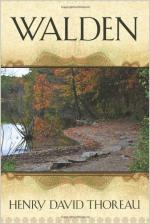|
|
Walden House-Warming
Thoreau went graping in October to harvest delicious concord grapes. While out, he found a lot of cranberries, which looked like red gems sitting on the ground, destined to be ruined by being made into jam and then sold.
"Digging one day for fish-worms I discovered the ground-nut (Apios tuberosa) on its string, the potato of the aborigines....Cultivation has well nigh exterminated it....This tuber seemed like a faint promise of Nature to rear her own children and feed them simply here at some future period. In these days of fatted cattle and waving grain-fields, this humble root, which was once the totem of an Indian tribe, is quite forgotten, or known only by its flowering vine; but let wild Nature reign here once more, and the tender and luxurious English grains will probably disappear before a myriad of foes...but the now almost exterminated ground-nut will perhaps revive and flourish in spite of frosts and wildness, prove itself indigenous, and resume its ancient importance and dignity as the diet of the hunter tribe." House-Warming, pp. 200-201
The maples began to turn in September, each gradually showing its character with the colors of fall. Thoreau encountered a new picture on the gallery wall each morning during the fall. He also encountered the wasps who came in October and infested his house. They got swept out in the morning when they were still cold.
Topic Tracking: My House Outdoors 4
The wasps left in November for winter quarters, when Thoreau got winter quarters himself. His house became winter quarters with the first fires he lit inside. First, he had to build his chimney: cleaning second-hand bricks, with his friend the poet visiting. Unfortunately, he also had to repair the chinks in the roof and walls, which meant that being inside was not as pleasing, but also much warmer. This was the first time he actually inhabited his house. The house seemed larger because it was one room. His dream house is even larger, but still only one room, and without any superfluous "ginger-bread work" around the edges. It could house everything, and everyone, from royalty to the common cook and servant. Everything is visible, hung on pegs, and the best part about the openness is you can hear the cooking no matter where you are. As a guest you have free run of the house, which is much more hospitable than the tradition of staying in a guest room, being kept apart from the rest of the house.
Thoreau began plastering the house when it began to freeze, and gathered and burnt his own limestone.
With the first freeze came the first bit of ice on the pond. The first ice is perfect and clear. You can lie on this new ice before it will support your weight standing. There are millions of tiny bubbles in this new ice that look like a string of beads. Thoreau threw some stones that broke through and made big white bubbles. With an Indian summer (a late warm spell), the ice lost its beauty. The white bubbles from the stones burst against the new lower layer of ice.
After this description, Thoreau chronicles the freezing of Walden Pond for the first time in five years.
As the pond freezes and winter comes, Thoreau realizes that food is much more appreciated when you have to hunt for it in the winter weather. With this weather also comes a new respect for wood, which seems every year to go up in price, because the demand never ceases.
He would consecrate wood groves to a God because they are so beautiful and awe-ful. Thoreau recognizes the value of his own woodpile - pine, old stumps, dry leaves for kindling, and green hickory. The smoke from his fire let everyone know that he was around (like the smoke from the village). He did not leave his house alone when he left - the fire was still there. But by leaving his fire going, he did narrowly escape catching the house on fire one day. The next year he used a cooking stove instead of an open fire for safety and efficiency, but missed the friendly, open fire that seemed to have animals and spirits in it.




